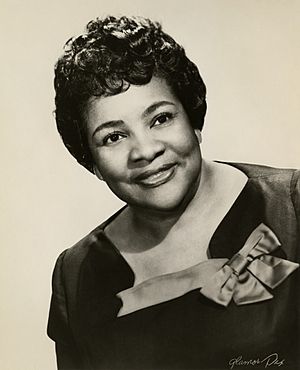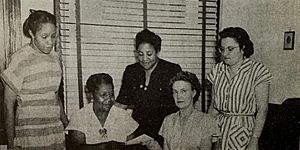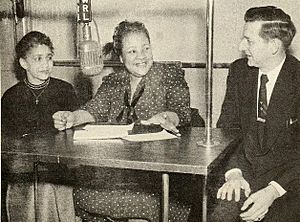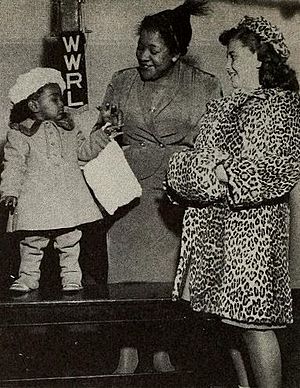Alma Vessells John facts for kids
Quick facts for kids
Alma Vessells John
|
|
|---|---|

John in 1963
|
|
| Born |
Alma Vessells
September 27, 1906 |
| Died | April 8, 1986 (aged 79) New York City, US
|
| Nationality | American |
| Other names | Alma Vessels John, Alma John |
| Alma mater | Harlem Hospital School of Nursing New York University |
| Occupation | nurse, civil rights activist, newsletter writer, radio and television personality |
| Years active | 1929–1986 |
Alma Vessells John (born September 27, 1906 – died April 8, 1986) was an amazing American woman. She was a nurse, a writer, and a star on radio and TV. She also worked hard for civil rights, fighting for fairness for everyone.
Born in Philadelphia, she moved to New York to study nursing. She finished her training in 1929 at the Harlem Hospital School of Nursing. After working as a nurse, she became a director at Harlem Hospital. Later, she became the first African-American woman to lead a nursing school in New York State. This was at the Upper Manhattan YWCA School for Practical Nurses.
During World War II, John helped more black women become nurses. She also led the National Association of Colored Graduate Nurses. Her goal was to make sure black nurses had the same chances as others.
In 1949, she wrote a radio show script. This led to a new career in radio and TV. She hosted popular shows like The Homemaker's Club and What's Right with Teenagers. She also interviewed important black figures on TV shows like Black Pride. Alma Vessells John is remembered for her important work in media and for fighting for civil rights.
Contents
Early Life and Education
Alma Vessells was born on September 27, 1906. Her family lived in Philadelphia, Pennsylvania. She was one of nine children and her family was very poor. When Alma was twelve, her mother died. As the oldest child, Alma helped raise her younger brothers and sisters.
Her father was a carpenter. Alma worked peeling vegetables and doing housework to earn money. Her family read a newspaper called Negro World. This newspaper helped her believe in hard work and be proud of her heritage. After high school, she moved to New York City to become a nurse. She joined the Harlem Hospital School of Nursing in 1926 and finished her studies in 1929.
Career Highlights
Nursing Career (1929–1951)
After becoming a licensed nurse, Alma Vessells worked at Harlem Hospital. In 1930, she became the director of their education and recreation programs. She married Cornwall Lisley John in 1937. He was a barber from Saint Vincent.
In 1938, John tried to help nurses get better pay and working conditions. She was fired from the hospital for this. Even though people tried to get her job back, she took a new one. In 1938, she became the director of the Harlem's Upper Manhattan YWCA School for Practical Nurses. This made her the first African-American woman to lead a practical nursing school in New York State.
John worked at the YWCA until 1944. Then, she became a speaker and advisor for the National Nursing Council for War Service. She worked with Estelle Massey Riddle to help solve the nurse shortage. They worked to get more black nurses trained. They also taught nursing schools how to increase the number of black students.
During this time, John went back to school. She earned her Bachelor of Science degree in 1946 from New York University. Her studies were in education and public health nursing. After graduating, she became the leader of the National Association of Colored Graduate Nurses. Her job was to remove unfair rules that stopped black nurses from moving forward. She also helped combine this group with the American Nurses Association. She traveled around the South to help nurses understand this change.
To reach more people, John started radio programs. In 1949, she wrote a script called Brown Women in White for WNBC. This show was about the struggles of black women becoming nurses. It was heard across the country. She continued to work as a consultant until the war ended. She was the last director of the National Association of Colored Graduate Nurses until it closed in 1951.
In 1950, John became a delegate for the NAACP. She was chosen to speak with President Harry Truman about civil rights. They talked about the need for fair voting rights and an anti-lynching law. John reported that before World War II, only 14 nursing schools accepted black students. By 1950, 304 schools allowed African-American students.
Radio and Television Career (1952–1978)
In 1952, John started writing and hosting The Homemaker's Club on WWRL radio in New York. The show gave household tips. It also featured conversations with guests about social issues. It aired five days a week across the country. In 1953, John became the first black woman to join the New York chapter of the Association of Women in Radio and Television. She worked with Mary Dee Dudley to make sure all their meetings were held in places that were not segregated.
Starting in 1954, John produced radio shows for teenagers. These included Alma John Talks to Teens and What's Right with Teenagers. These shows encouraged black youth to finish school and aim for good careers. Teenagers produced and directed What's Right with Teenagers. John helped them write scripts and plan programs. She also helped many students find jobs.
In 1957, she won the McCall's Golden Mike Award. This was for her work on What's Right with Teenagers. She was the first black woman to receive this award. In 1959, she became the director of women's programming for WWRL.
Over 25 years at WWRL, she produced many shows. These included Alma John Shoppers' Guide and Household Hints. They gave advice on budgeting, decorating, and healthy eating. She also produced The World at Your Doorstep, which featured talks with visitors from other countries. Another show, Golden Agers, was for senior citizens. She also covered public service topics like health and civil rights. Famous guests like Eleanor Roosevelt appeared on her shows. She received many awards for her work.
In 1970, WPIX television station in New York City asked her to host a show. It was about black issues and achievements. For two years, she hosted Black Pride. Then, in 1972, she became the show's producer. The program aired twice a week. It featured many important guests. These included Coretta Scott King, Ella Fitzgerald, and Rosa Parks. She also hosted another talk show called Positively Black. Her last TV show was Like It Is in 1978.
Later Career (1977–1986)
From 1979 to 1986, John hosted the Alma John Workshops. She also published a newsletter with the same name. These workshops helped improve communities. They focused on education and public health. People of all ages could share their creative work. The workshops also organized visits to prisons and children's homes. John traveled widely and spoke to many groups about her work.
Death and Legacy
Alma Vessells John died on April 8, 1986, at Harlem Hospital. She had a stroke the day before. Her funeral was held on April 12. On May 1, the United States House of Representatives honored her memory.
She is remembered for her important work in civil rights and nursing. She was also a pioneer in radio. She inspired many people who work in media today. Her papers are kept at the Schomburg Center for Research in Black Culture in New York City. She was also featured in a documentary series called Black Radio: Telling It Like It Was.
 | Victor J. Glover |
 | Yvonne Cagle |
 | Jeanette Epps |
 | Bernard A. Harris Jr. |




